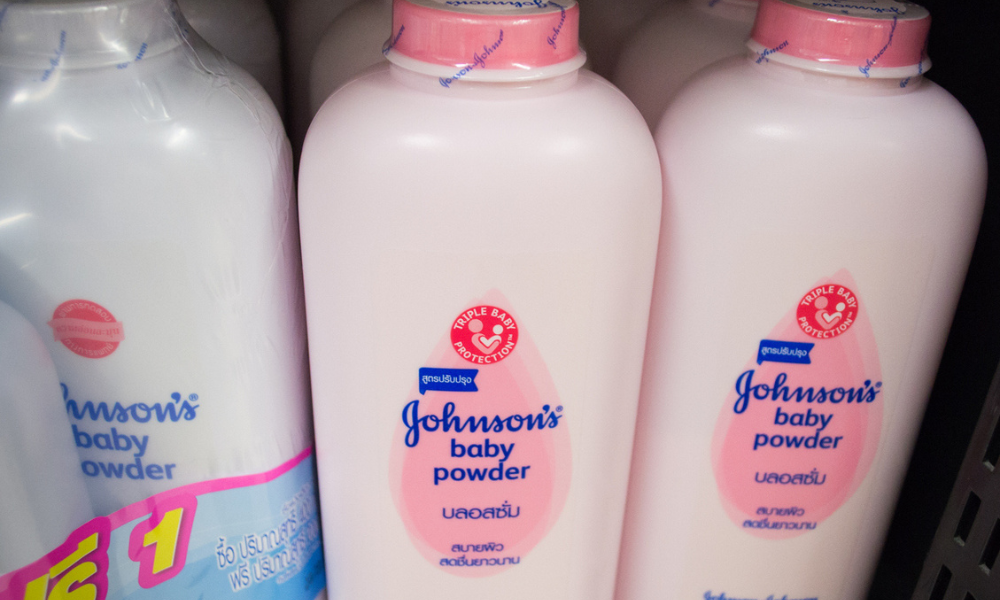
They claimed the data must be accessible under a crime-fraud exception to lawyer-client privilege

Co-lead counsel in a lawsuit against Johnson & Johnson requested that a judge grant access to communications among the company's top in-house lawyers to demonstrate misuse of the bankruptcy process in ongoing litigation over talcum powder alleged to cause cancer.
Law firms Beasley Allen and Ashcraft & Gerel argued that these communications should be accessible under a crime-fraud exception to attorney-client privilege, as reported by Bloomberg Law. The firms contend that Johnson & Johnson is attempting to fraudulently transfer its liabilities to an underfunded corporate entity through a divisional merger and resolve them via a “Texas two-step” bankruptcy process.
The ABA Journal has reported that Johnson & Johnson twice attempted to settle the talcum powder cases using the Texas two-step bankruptcy strategy. This process involves splitting the company into two entities, separating assets and liabilities. The original company then dissolves, and the entity holding the liabilities files for bankruptcy. Despite these efforts, Johnson & Johnson’s previous attempts have failed.
Bloomberg Law reported that Johnson & Johnson is making a third attempt at the Texas two-step process. Additionally, the company is pursuing a prepackaged bankruptcy reorganization plan that proposes a US$ 6.5 billion settlement to resolve tens of thousands of lawsuits alleging that traces of asbestos in the company’s baby powder caused ovarian cancer. This deal would require approval from 75 percent of talc plaintiffs.
Johnson & Johnson maintained that its talc products are safe despite agreeing to the settlement.
Beasley Allen and Ashcraft & Gerel also sought a temporary restraining order to block the global settlement. Their lawsuit focused on the Texas two-step bankruptcy process.
The lawsuit, filed in New Jersey federal court, stated that before the first bankruptcy filing, Johnson & Johnson Consumer Inc. was divided into LTL Management, which held talc liabilities, and another entity that retained nearly all of Johnson & Johnson's assets, continuing under the name Johnson & Johnson Consumer Inc. LTL Management then sought bankruptcy protection.
During the first bankruptcy case, Johnson & Johnson transferred its consumer health business assets to corporate parent Janssen Pharmaceuticals and then to a new entity called Kenvue, which owns brands like Tylenol and Listerine and a talc-free baby powder.
Initially, LTL Management had a funding agreement for indemnity from Johnson & Johnson for talc costs, valued at approximately US$ 61.5 billion. However, a federal appeals court dismissed the first bankruptcy case in January 2023, ruling that LTL Management was not in financial distress.
In the second bankruptcy attempt, the funding agreement for LTL Management was reduced to US$ 29.9 billion and funded solely by Johnson & Johnson Consumer Inc. In July 2023, a bankruptcy judge dismissed the second case, citing that LTL Management was still not in imminent financial distress.
The lawsuit alleged Johnson & Johnson plans further corporate transfers, potentially constituting additional fraudulent transfers. The suit called for past fraudulent transfers to be declared void to ensure talc victims have access to assets for their claims.
Meanwhile, Johnson & Johnson sought discovery on Beasley Allen’s litigation funding arrangements. In a brief filed in federal multidistrict litigation in New Jersey, Johnson & Johnson described its US$ 6.5 billion settlement offer as "unprecedented" and in the best interest of claimants. The company claimed Beasley Allen is "vehemently opposed" to the prepackaged bankruptcy.
“Given the extreme lengths to which Beasley Allen (and its co-counsel) have gone to derail voting on the proposed prepackaged bankruptcy, defendants are left with no choice but to seek discovery that would shed light on what is really driving the firm’s persistent and vocal anti-vote campaign,” Johnson & Johnson stated in its brief.